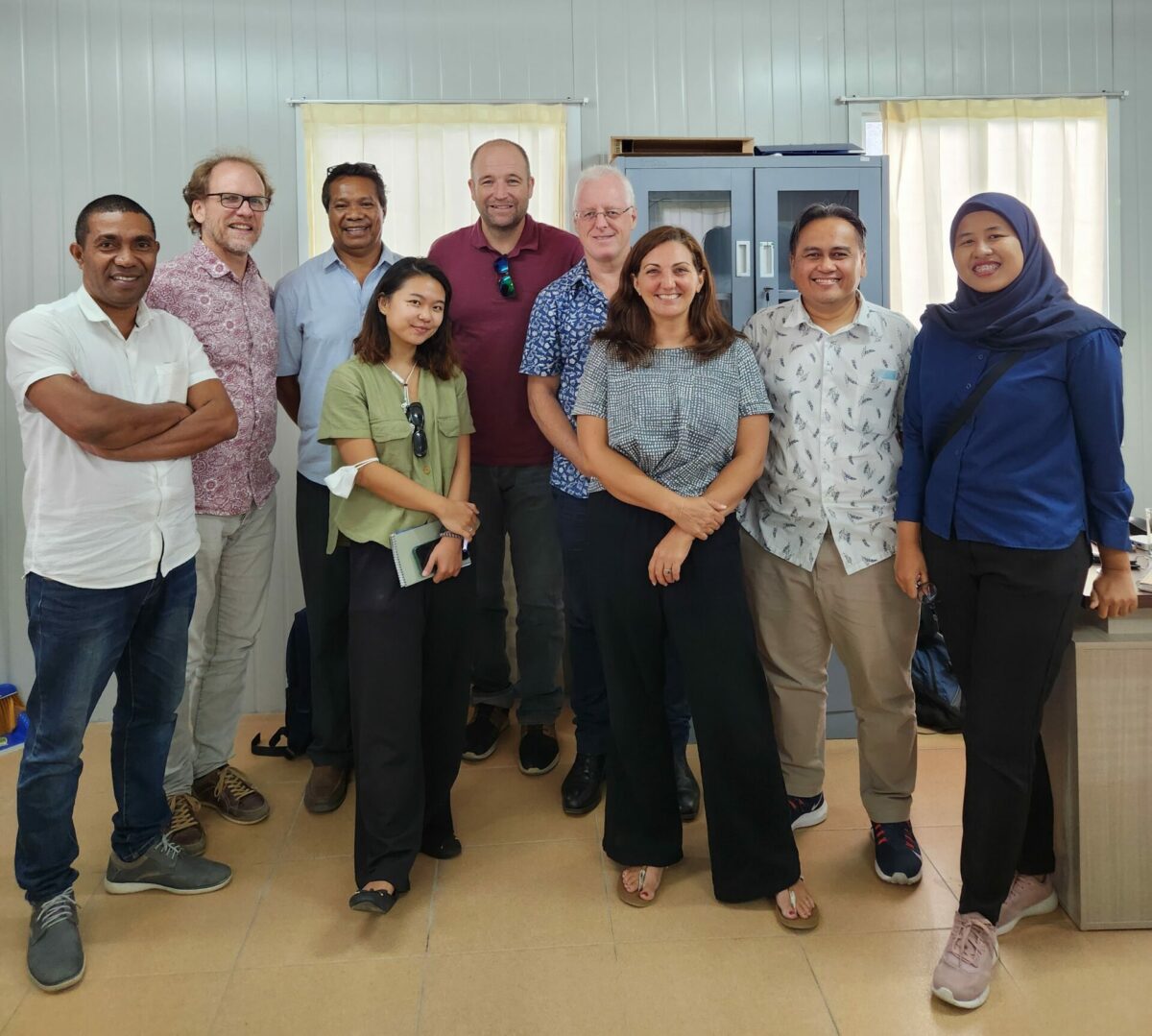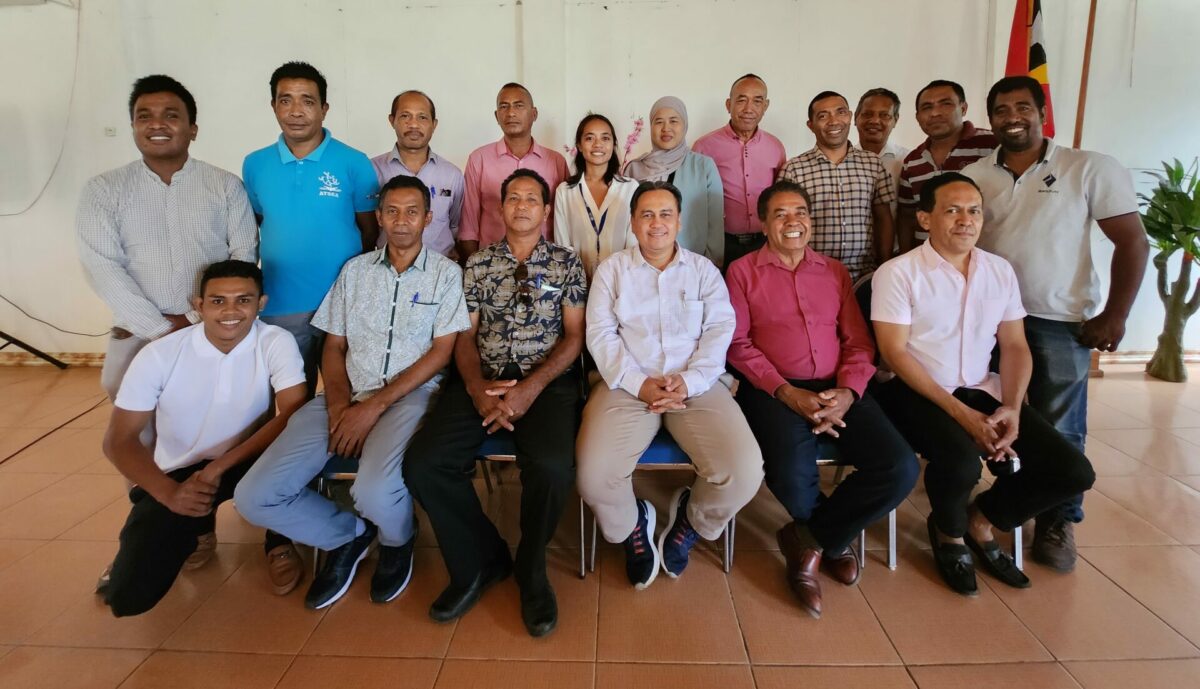From 8-12 March 2023, the ATSEA-2 Regional Project Management Unit (RPMU) visited Dili and Viqueque in Timor-Leste, in order to provide updates on project progress through meetings with related organisations. The team included the Regional Project Manager, Dr. Handoko Adi Susanto, together with RPMU members Stella Puteri and Deti Triani, who met with representatives from the Minderoo Foundation, Blue Ventures and World Fish, as well as officials from the Ministry of Agriculture and Fisheries (MAF) and the National Coordinating Unit (NCU) of Timor-Leste.
All representatives discussed the progress of their respective projects and shared information to ensure the various organisations are aligned and can work effectively together in Timor-Leste to secure priority areas for fisheries and biodiversity. Barefoot Ocean will focus on fish larvae dispersal modelling to find the best area for the no-take zone; WorldFish will focus more on programs in the field, supported by capacity building; and Blue Ventures will work on engagement with local people, with the aim of supporting community-based fisheries management.
On the second day of the visit, the team had a meeting at the MAF office, which was attended by MAF officials and representatives from other NGOs. Dr Handoko Adi Susanto presented the project updates, end-of-project targets and future plans for ATSEA program. He reiterated that ATSEA-2 Project is a government project, not an NGO or an exclusive entity, and that the RPMU is responsible for updating the progress of the project to the government and Regional Steering Committee (RSC). He also provided information regarding future activities and milestones relevant to the four NGOs, as collaborative stakeholders who will subsequently be involved in the ATSEA program implementation.

Dr Susanto then provided updates on several activities, including the recent Transboundary Diagnostic Analysis (TDA) and Strategic Action Plan (SAP) workshop, which was attended by representatives from MAF and a TDA consultant from UNTL, along with the Timor-Leste TDA Regional Working Group. The workshop was held to review and collect inputs on the final draft of the TDA, including agreement on the prioritisation of transboundary issues. The MAF is expected to endorse the document by the end of March. NCU Timor-Leste has prepared an invitation letter for the TDA validation workshop on March 14, 2023.
With regards to the Regional SAP, Dr Susanto informed the MAF that there will be a meeting in May as a follow-up to the previous session in Bali. This will be attended by the MAF, specifically the National Program Directors (NPD). In parallel, NCU Timor-Leste will also update the Timor-Leste National Action Program (NAP).
The team also provided updates on ongoing activities related to the end-of-project targets in Timor-Leste. These include the establishment of the National Inter Ministerial Committee (NIMC), the implementation of local regulations for MPA Manufahi, and the hiring of consultants by UNDP to update the NAP. In addition, Indonesia has gazetted a new MPA area in Kolepom Island, South Papua, and the team is working on an oil spill response system that should be integrated into the Integrated Coastal Management (ICM) plan in Manatuto.
Customary Laws and MPA Establishment in Timor-Leste

Timor-Leste heavily relies on marine resources for its economy and food security. However, the livelihoods of its people, particularly in the southern coastal region, are at risk due to climate change and external threats such as Illegal, Unreported, and Unregulated Fishing (IUU) fishing and oil spills.
In response to these challenges, the MAF of Timor-Leste has pledged to establish a Marine Protected Area (MPA) in the south coast region. UNDP Timor-Leste, as the ATSEA-2 Project implementer, followed up on this commitment with the support of the Coral Triangle Center (CTC) in 2022, by conducting a scoping study in Manufahi Municipality. The study included a desktop study, consultative workshop with stakeholders and field surveys to collect biophysical, socio-economic and cultural data.
Initially, MAF decided to establish an MPA covering only 20,906 hectares in Manufahi Municipality. However, after a recent meeting with the ATSEA-2 RPMU in Dili on 9 March 2023, MAF made a bold commitment to more than double the MPA’s coverage to 51,000 hectares. This extension will cover four nautical miles of Manufahi waters and extend the MPA to Barique, Manatuto Municipality, thereby covering the ICM area.
This decision is a significant step towards achieving the country’s target of ensuring the long-term sustainability of small-scale fisheries that are essential to the local economy. The MPA is expected to support the development of sustainable fisheries practices that can adapt to changing environmental conditions, such as the use of selective fishing gear and the establishment of fishery co-management systems. By prioritising the protection of small-scale fisheries and promoting sustainable practices, MAF Timor-Leste is taking a proactive approach to ensure the long-term viability of livelihoods for fisherfolk and the health of marine ecosystems in the south coast region.
As the next step towards MPA establishment, the ATSEA-2 Project team in Timor-Leste will conduct an extended survey in Barique, Manatuto, while also designing the no-take zone area based on the overall survey and finalising the management plan. This commitment to marine conservation by Timor-Leste and its partners is commendable and will undoubtedly have a significant impact on preserving the country’s marine resources for future generations.
Following a fruitful discussion with a number of stakeholders, the team’s agenda also included in-depth interviews with local stakeholders and community members to develop community stories in Viqueque. Here, the ATSEA-2 Project team had the opportunity to find out how the fishers live and how they have been involved in a number of training and capacity-building sessions. The team were also able to explore a customary law called Tara Bandu, which not only protects and preserves the environment, but also ensures food security for the local community.
After learning about the community’s use of Tara Bandu as a means of preserving the environment and ensuring food security, the ATSEA-2 project team is excited to share more about this unique customary law in our upcoming quarterly newsletter. Stay tuned to learn more about how communities in Viqueque and beyond are using traditional knowledge and practices to protect their natural resources and improve their livelihoods.
By Deti Triani and Stella Yovita Arya Puteri


